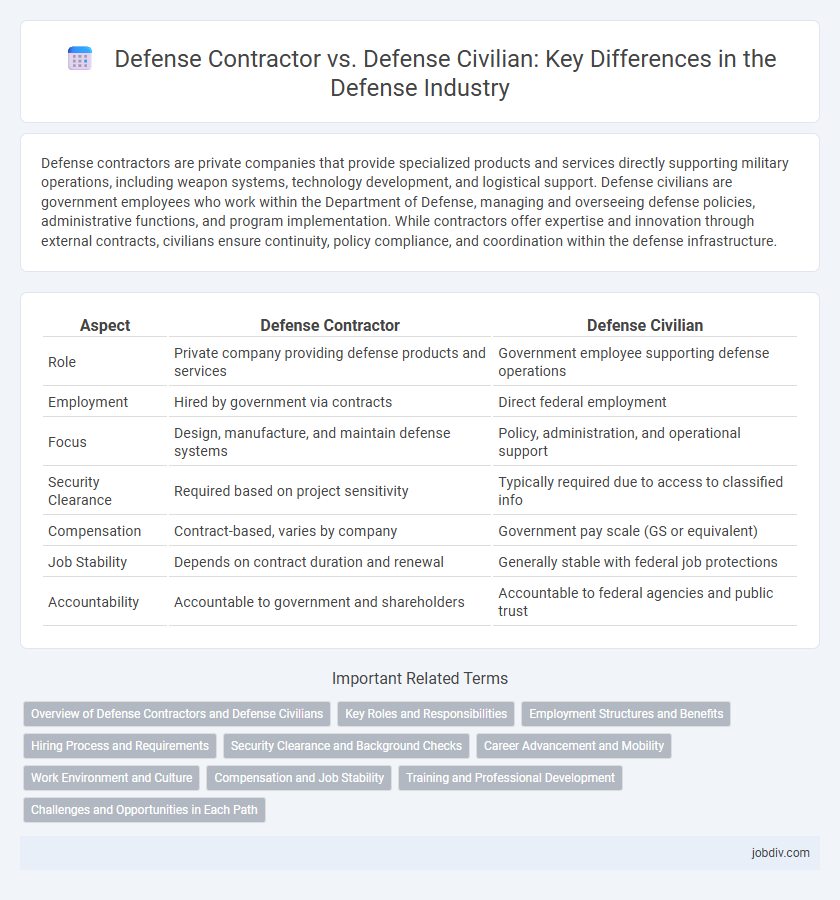Defense contractors are private companies that provide specialized products and services directly supporting military operations, including weapon systems, technology development, and logistical support. Defense civilians are government employees who work within the Department of Defense, managing and overseeing defense policies, administrative functions, and program implementation. While contractors offer expertise and innovation through external contracts, civilians ensure continuity, policy compliance, and coordination within the defense infrastructure.
Table of Comparison
| Aspect | Defense Contractor | Defense Civilian |
|---|---|---|
| Role | Private company providing defense products and services | Government employee supporting defense operations |
| Employment | Hired by government via contracts | Direct federal employment |
| Focus | Design, manufacture, and maintain defense systems | Policy, administration, and operational support |
| Security Clearance | Required based on project sensitivity | Typically required due to access to classified info |
| Compensation | Contract-based, varies by company | Government pay scale (GS or equivalent) |
| Job Stability | Depends on contract duration and renewal | Generally stable with federal job protections |
| Accountability | Accountable to government and shareholders | Accountable to federal agencies and public trust |
Overview of Defense Contractors and Defense Civilians
Defense contractors are private companies that provide specialized products and services such as weapons systems, technology, and logistics to military organizations under government contracts. Defense civilians are non-military government employees who support defense operations through administrative, technical, and policy roles within defense agencies. Both entities are essential to national security, with contractors focusing on innovation and production, while civilians handle internal defense operations and strategic planning.
Key Roles and Responsibilities
Defense contractors primarily provide specialized technology, equipment, and logistical support, developing advanced weapon systems and cybersecurity solutions crucial for national security. Defense civilians oversee policy implementation, acquisition processes, and strategic planning within government agencies, ensuring compliance with regulations and efficient resource management. Both roles are critical, with contractors focusing on innovation and production, while civilians manage administrative, operational, and support functions.
Employment Structures and Benefits
Defense contractors operate under private sector employment structures, offering project-based contracts with variable benefits often tied to contract duration and company policy. Defense civilians, employed directly by government agencies such as the Department of Defense, receive standardized federal benefits including pensions, health insurance, and job security under the General Schedule pay scale. Employment stability for defense civilians is generally higher compared to defense contractors, who face fluctuating job security based on government procurement cycles.
Hiring Process and Requirements
Defense contractors typically undergo a stringent hiring process involving background checks, security clearances, and specialized skill assessments aligned with Department of Defense (DoD) standards. Defense civilians, employed directly by the federal government, must meet federal employment requirements, including eligibility for security clearances and compliance with strict ethical and citizenship criteria. Both roles demand comprehensive validation of qualifications and adherence to cybersecurity protocols to support national defense objectives.
Security Clearance and Background Checks
Defense contractors undergo rigorous security clearance processes, often requiring investigations by the Defense Counterintelligence and Security Agency (DCSA) to access classified information. Defense civilians, as government employees, face similarly strict background checks mandated by federal regulations, including fingerprinting, financial reviews, and interviews to ensure loyalty and reliability. Both roles demand adherence to stringent security protocols, but contractors may experience more frequent re-investigations due to contract-specific requirements.
Career Advancement and Mobility
Defense contractors often experience faster career advancement due to competitive project-based environments and access to specialized training opportunities. In contrast, defense civilians benefit from structured federal career paths with stable promotion criteria and mobility through interagency transfers and government programs. Both roles offer unique mobility options, but contractors may find greater flexibility in shifting between private sector projects and government contracts.
Work Environment and Culture
Defense contractors often operate in fast-paced, contract-driven environments with a focus on innovation, meeting strict deadlines, and adhering to proprietary security protocols. Defense civilians typically work within government agencies, where the culture emphasizes stability, structured hierarchies, and adherence to public sector regulations and policies. The contractor environment fosters adaptability and entrepreneurial mindset, whereas the defense civilian setting prioritizes long-term service and bureaucratic processes.
Compensation and Job Stability
Defense contractors often receive higher compensation packages compared to defense civilians, reflecting specialized skills and contract-based work arrangements. Job stability tends to be greater for defense civilians due to government employment protections and long-term funding commitments. Contractors may face variability in employment duration depending on contract renewals and project needs.
Training and Professional Development
Defense contractors often receive specialized training tailored to advanced technology and project-specific requirements, enhancing their expertise in cutting-edge defense systems. Defense civilians benefit from continuous professional development programs offered by government agencies, focusing on policy, compliance, and operational protocols. Both pathways emphasize skill enhancement, but contractors prioritize technical proficiency while civilians focus more on strategic and administrative competencies.
Challenges and Opportunities in Each Path
Defense contractors face the challenge of navigating complex government regulations and securing long-term contracts, with opportunities in technological innovation and scalable production capabilities. Defense civilians encounter hurdles in bureaucratic processes and limited budget flexibility but benefit from stable employment and direct involvement in policy development. Both paths offer unique prospects for contributing to national security through specialized expertise and strategic project implementation.
Defense Contractor vs Defense Civilian Infographic

 jobdiv.com
jobdiv.com